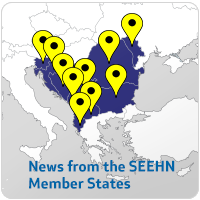
Considering the Ebola epidemic as a public health imperative that might as well become a geopolitical crisis if uncontrolled, 44 prominent academics, clinicians, and health professionals from 15 European countries call for EU Member States to mobilise all possible resources so to assist the affected countries in taming the latest Ebola epidemic, considered by many the worst in history.
“Following months of inaction and neglect from the international community, the latest Ebola epidemic has become a threat not only to West Africa where the outbreak has overwhelmed the capacity of national health systems, but also to the entire world”, states the open letter to the European governments.
The measures proposed as particularly effective were put in writing on behalf of the 44 signatories by Jose M Martin-Moreno, Preventive Medicine and Public Health, University of Valencia, Walter Ricciardi European Public Health Association and Catholic University of the Sacred Heart, Vesna Bjegovic-Mikanovic, Association of Schools of Public Health in the European Region and University of Belgrade, Peggy Maguire, European Public Health Alliance, and Martin McKee, European Centre on Health of Societies in Transition, London School of Hygiene and Tropical Medicine.
By signing the letter, they call on the European governments to 1) create mechanisms allowing health professionals to volunteers for temporary leave to assist with the health crisis, 2) provide field laboratories, surveillance resources, diagnostic equipment, and mobile communications software and technology as well as basic infrastructure, and 3) supply the health-care professionals and communities with personal protective equipment and disinfectants. Furthermore, they demand from the European governments to incentivize private companies to reverse travel restrictions to afflicted regions and to mobilise military and civil transport by air, sea, and land to ship food, supplies, and personnel to the African communities in need.
The South-Eastern Europe Health Network recognizes the significance of these measures as well as the necessity of global and strategic response and thus shares this open letter so to raise awareness and encourage the relevant actors to contribute to the epidemic control efforts in the region.
The open letter to the European governments has been published in the Lancet, the world’s leading general medical journal, and can be read in its entirety at the following link.





